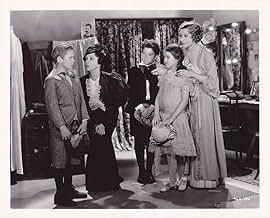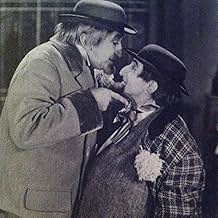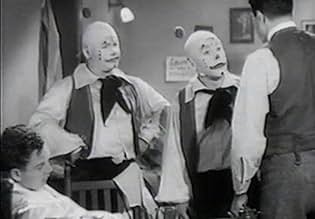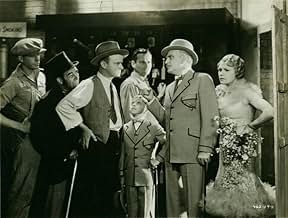Ajouter une intrigue dans votre langueA vaudeville couple quit to raise a son, then come back with their grandson in the act.A vaudeville couple quit to raise a son, then come back with their grandson in the act.A vaudeville couple quit to raise a son, then come back with their grandson in the act.
- Réalisation
- Scénario
- Casting principal
- Récompenses
- 3 victoires au total
- Dancing Ensemble - Edited from The March of Time (1930)
- (images d'archives)
- (as Albertina Rasch Dancers)
- Cousin David
- (non crédité)
- Man in Balcony
- (non crédité)
- Joe Mannion
- (non crédité)
- Wanda
- (non crédité)
- William Collier Sr. - Vaudeville Act
- (images d'archives)
- (non crédité)
- Self
- (images d'archives)
- (non crédité)
Avis à la une
There is a bit of obvious pre-code Hollywood at times, which time stamps the movie, and so many cast members became Hollywood legends. And offense taken by Buster Keaton is notable off-screen insight.
So, it depends on the lens you look through. The long-shot lens of this time capsule shows some tragedy, closeups show some comedy, as Chaplin once said about film making.
I enjoyed this. Frank Morgan, Mickey Rooney, Alice Brady, Jimmie Durante, Curly and Moe Howard, Jackie Cooper... footage from an unreleased musical that otherwise wouldn't have any use... so many careers and so much information floated the boat for what otherwise may have been a creaky ship of viewing.
I was entertained on several levels.
The first tale is why this film was made in the first place. In late 1930 MGM producer Harry Rapf was making a sequel to the Hollywood Revue of 1929. Unfortunately, musicals went out of fashion before the movie was finished and MGM had to shelve the project. Thus MGM was saddled with some very expensive musical footage and no movie. This film was an attempt to try to fit a story around some of that footage and recoup some of the losses. That is why you'll find long and often elaborate production numbers that don't really fit the plot placed awkwardly at points along the movie.
The second tale of interest is how this movie was considered by Buster Keaton to be "the final insult" hurled at him by MGM after they unceremoniously fired him this same year - 1933. He thought that the story of the third generation of Hacketts - Ted Hackett III - looked just a little too autobiographical to be a coincidence. Ted the 3rd is the member of a famed vaudeville family who gets recruited to go into motion pictures. Once he gets to Hollywood he begins to drink heavily - a vice that his father also had - and his drinking causes him to be late to the movie set if he even bothers to show up at all. Buster was furious about this movie, and nobody could convince him his own problems with MGM were not at the foundation of the plot and that it was simply an attempt to salvage "The March of Time" alias The Hollywood Revue of 1930.
Take these points of interest away from the film and there really is not much to see here other than Morgan and Brady's excellent performance as the senior generation of Hacketts who see "the march of time" from the height of vaudeville's popularity through the arrival of talking pictures which renders their profession obsolete.
Alice Brady and Frank Morgan play Ted and Lulu Hackett, vaudeville performers who want their name to be known for generations, which it indeed does, but not in the way they expected as their son, Ted Jr., travels to broadway and later Ted Jr.'s son, Ted III goes to make pictures in Hollywood. Alice Brady and Frank Morgan do a good job as the stars with the most screen time but their husband/wife bickering can get boring after a while.
Many of the stars who received top billing in the film, (Jackie Cooper, Mickey Rooney, Jimmy Durante, etc.) only appear in the film for a couple minutes so you would have to be a huge fan to sit through the whole film just to see them. Another interesting cameo is in the middle of the film when two freaky-looking Dutch clowns appear with Ted Hackett Jr. (played by Russell Hardie). I didn't realize this the first time I watched it, but the two clowns are actually played by brothers Moe and Curly Howard of the Three Stooges. As a longtime fan of the trio, this alone was a reason to buy the film and give it another watch.
Besides the ending of it being a little out of place, I enjoyed most of the film throughout. It isn't the most entertaining flick ever made, but I definitely suggest seeing it when you get the chance.
Amazingly enough, in a movie set in vaudeville, none of the lead actors can dance. They're either filmed from very far away with obvious dance doubles, or in tight closeups that show them moving only their shoulders with huge grins. The exceptions are the kids, Jackie Cooper and Mickey Rooney, who ironically plays Jackie's son. You have to wait an hour to see him, and once again, he's only on the screen for a few minutes. This is a generational saga, with Frank and Alice aging decades in the ninety minutes. They start off as a young couple, then wind up with a grown-up grandson in their midst. If you're renting this movie to see the kiddies, you'll be disappointed. You'd better be watching it for Frank and Alice, who age very gracefully. With their white hair, Alice's dowager hump, and Frank's dark circles that show the hard life they've lived, it really feels as if you've known them their entire lives.
In the start of the movie, their gag at the end of their song and dance is for Alice to pick up a bouquet of roses thrown on the stage. Frank says to the audience, "I'll find the fellow who sent her those and break his neck!" to a strong laugh. As the decades pass, the laughter dwindles, and even though Frank's tone gives the same delivery, his eyes show he's humiliated and disappointed that he's never achieved more. Finally, as an old man, he uses a monocle, has a slack jaw, and wobbles his legs when he rises from his chair, all while preserving the dignity of a man who used to entertain audiences with his legs and the ladies with his good looks. If you're a Frank Morgan fan, rent it; he truly embodies the old hoofer who's tried and failed his whole life. If you're not, you probably won't enjoy it.
Le saviez-vous
- AnecdotesNelson Eddy - 33 at the time - was required to do a screen test for the film). Eddy's test took 58 takes and even the best was determined to be awful. MGM studio head Louis B. Mayer overruled everyone and ordered that he be only used for a singing sequence in the film.
- Citations
Lulu Hackett: Actors haven't any more rights than other people. Anyway, I ain't crazy over actors.
Ted Hackett: Aww, don't say that, mama. It's a grand old profession.
Lulu Hackett: Yeah, I don't know about that. We're like monkeys climbing up and hanging by our tails, and the people outside the cages laugh and think it's funny. Yeah. Well, that's all right, so long as we don't quit amusing them.
Ted Hackett: Yeah, but we never quit. That's something performers don't do. They go on and on. They die, mother, but they don't quit.
- Crédits fousIntro: "New York in the late 80's. Its great variety hall and most popular place of entertainment - - Tony Pastor's Theatre - where the greatest celebrities known to the amusement world started their careers. Upon its historical old stage this story begins."
- ConnexionsEdited from The March of Time (1930)
Meilleurs choix
- How long is Broadway to Hollywood?Alimenté par Alexa
Détails
- Durée1 heure 25 minutes
- Couleur
- Rapport de forme
- 1.37 : 1





















